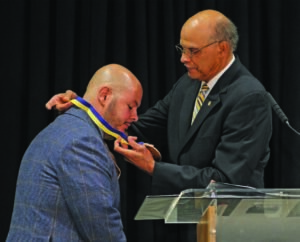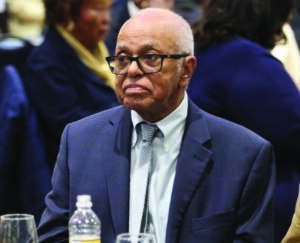 February 1 Panelists: Delaney Vandergrift, Marcus Bass, Dr. Oliver Thomas, David Miller and Pamela McCorkle Buncum. Photo by Joe Daniels/Carolina Peacemaker.
February 1 Panelists: Delaney Vandergrift, Marcus Bass, Dr. Oliver Thomas, David Miller and Pamela McCorkle Buncum. Photo by Joe Daniels/Carolina Peacemaker.Former North Carolina Agricultural and Technical State University student government association (SGA) presidents gathered to speak on their experiences on campus across four decades of social justice and activism at the annual February 1 sit-in breakfast.
 Lynch Hunt receives the Human Rights Medal from A&T Chancellor Harold Martin. Photo by Joe Daniels/Carolina Peacemaker.
Lynch Hunt receives the Human Rights Medal from A&T Chancellor Harold Martin. Photo by Joe Daniels/Carolina Peacemaker.The theme, “Embracing Our Past, Engaging Our Present, Imagining Our Future,” engaged past SGA presidents in a discussion on the most poignant moments of their tenure, and the various social justice issues that took the forefront of their generation’s conversations. Moderator for the discussion was Oliver M. Thomas, Ph.D., Director of External Affairs at N.C. A&T.
Only 20 years after the 1960 sit-ins, Pamela McCorkle Buncum, SGA President 1980-1981, became the fourth female SGA President in the association’s history. She was elected shortly after the 1979 Greensboro Massacre, which refers to a worker’s rights rally in Morningside Homes that left five people dead and more injured after the Ku Klux Klan and Neo-Nazi groups opened fire on the marchers.
“My administration started in a tumultuous way. We had just experienced the Greensboro Massacre,” said Buncum, adding that the students knew that they had to be involved with addressing the injustices that resonated throughout the city following the incident.
She added that everyone has a role to offer in addressing social injustice After a career as an accountant and financial internal auditor, Buncum now uses her professional and volunteer experiences to serve on multiple education and housing boards and commissions that address equality for African Americans.
“We must continue to have these days of remembrance. We must continue to tell our stories to be able to appreciate the change when it comes. It can get lonely and exhausting in this fight. If you don’t realize that battles are being won, then you can’t see the light,” said Buncum.
By the 90s, the student body was studying Nelson Mandela’s release from prison and the Anti-Apartheid Movement in South Africa. Students used it as a model to address social injustices in Greensboro.
David Miller, SGA President 1989-1990, shared how students worked to support MLK Day as a paid government holiday by coordinating large marches from campus to city hall, they pushed for more representation on campus and in civic leadership, and petitioned for local merchants to carry A&T apparel alongside other schools such as those in the Atlantic Coast Conference (ACC).
 A&T Four member Joseph McNeil. Photo by Joe Daniels/Carolina Peacemaker.
A&T Four member Joseph McNeil. Photo by Joe Daniels/Carolina Peacemaker.“There is power in the vote, and we must leverage that. We have to continue to answer the call, This is not a sprint, this is a marathon. We cannot get content, we have to keep our eyes on the bigger picture,” he said.
The energy behind the student vote continued to magnify over the years and hit a peak in 2008, when the student body launched one of the largest student voter mobilization initiatives that included other local colleges and universities to vote in the historic election of former U.S. President Barack Obama.
Marcus Bass, SGA President 2008-2009, said to make sure that people don’t try to change the narrative of the A&T Four. Bass serves as the executive director of Advance North Carolina, a political strategy and advocacy organization.
“It was never about the breakfast or the food at Woolworth’s. And it wasn’t about eating where White folks ate. It was about the ability to do what everyone wants to do, live, and exist freely in this country,” he said. “The work to keep the name ‘A&T Four’ is intentional. Take this breakfast experience outside of this room. Figure out how we conceptualize the next 63 years of this legacy.”
Delaney Vandergrift, SGA President 2018-2019 noted that she believes the legacy she left would be that she empowered students to say something. Student-led politics had entered the digital age by the late 2010s and students began using social media platforms to get involved in activism.
“Whether you stand up and say something, or you tweet it. Ultimately, that is your power, as college students, to say something,” said Vandergrift, who is now a social impact manager for MTV Entertainment Studios.
She added that our survival is dependent on realizing that we are connected to one another, being committed to movement organizing and working to make the world a better place.
“To the folks in the room who are a little more seasoned, young people are ready to move forward and take up space. That means there must be room for them to sit down and take up space. To the young people, take the space,” she said.
Chancellor Harold Martin presented the university’s 2023 Human Rights Medal to two awardees: Chance D. Lynch, Esq., (N.C.A&TSU class of ’06), a Charlotte based attorney who has served as legal counsel on high profile civil rights cases across the nation; and Safiya U. Noble, an internet studies scholar and professor of Gender Studies at the University of California, Los Angeles.
After breakfast, attendees joined the families of the A&T Four for the annual memorial wreath-laying at the February One monument on campus, followed by a social justice discussion in Harrison Auditorium, featuring guest speaker Donovan Livingston, Ph.D., Senior Director of Program Operations at the Emily K Center in Durham.